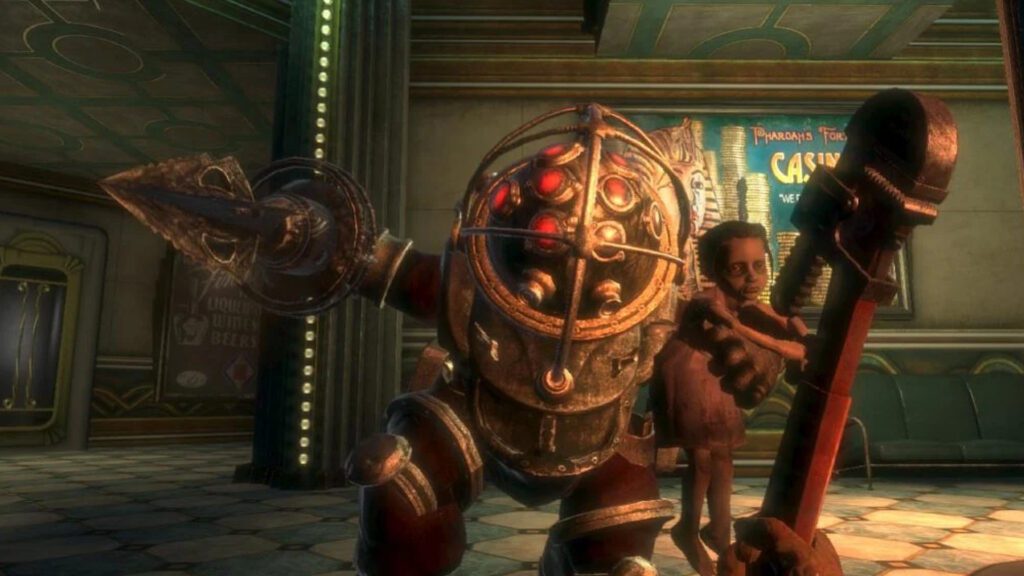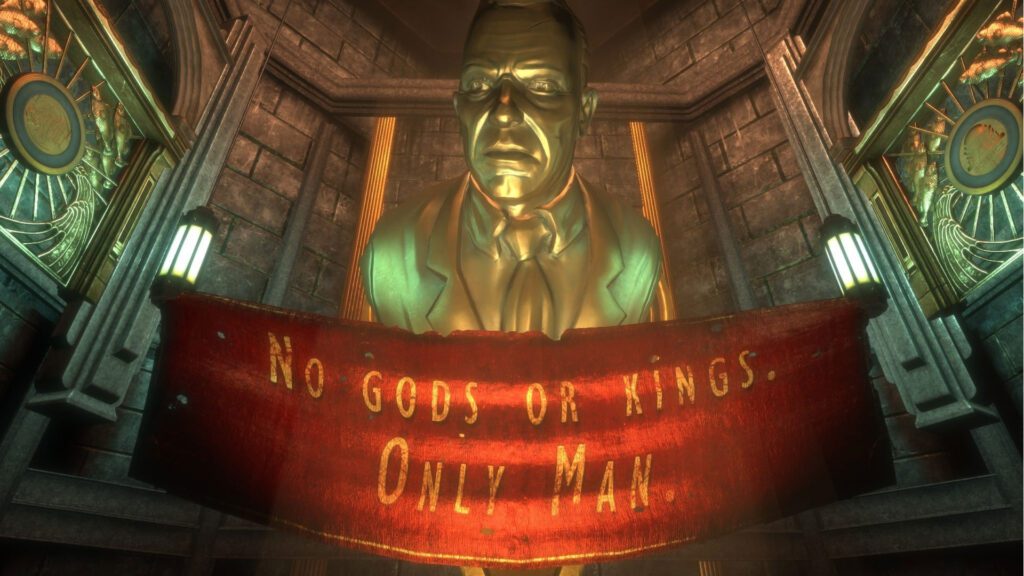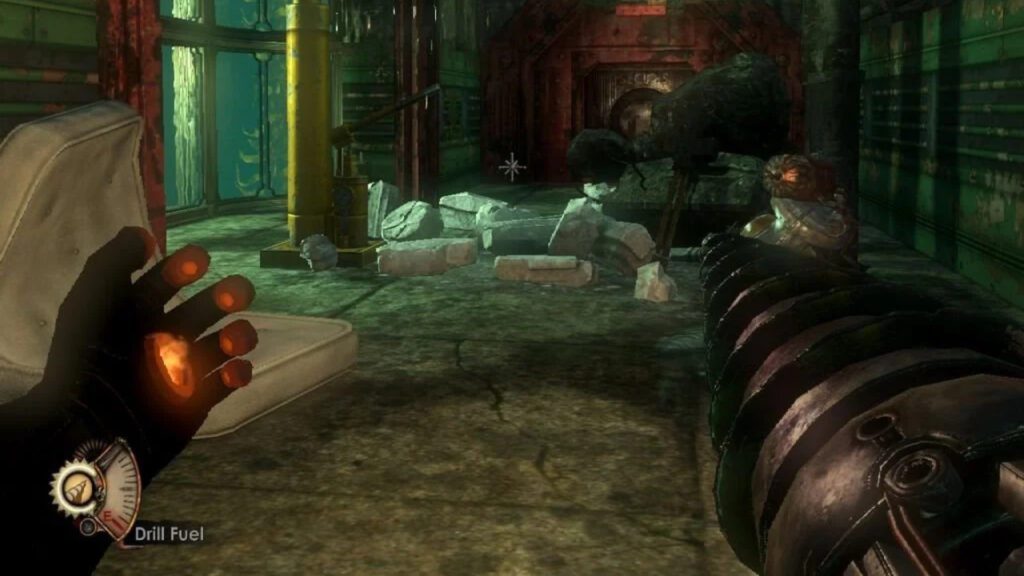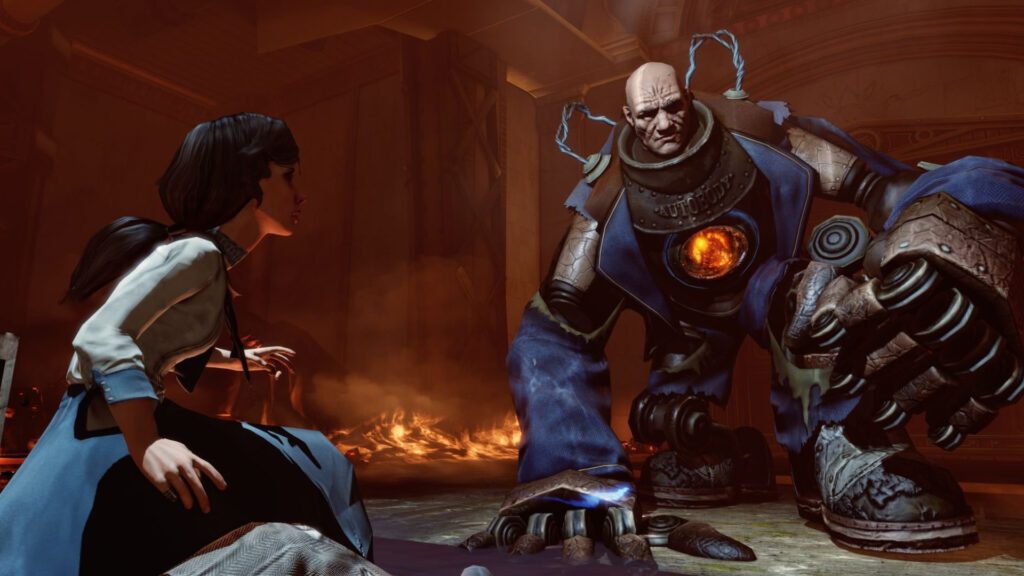WARNING: this article is a personal take on a many-years old franchise, but still, several aspects of its story are discussed below: we’ll try and make things as light as possible, but be warned of possible spoilers throughout the entire piece.
Look, I get it. BioShock. The name alone conjures images of groundbreaking narratives, stunning art deco worlds, and philosophical depth. Critics rave about it, fans adore it, and its legacy is undeniable.
And yeah, I’ve played them all. I’ve walked the leaky halls of Rapture, soared through the cloud cities of Columbia, and seen the twists everyone talks about. But here’s the thing: for all its celebrated genius, BioShock never quite grabbed me the way it seemingly grabbed everyone else.
Note: Affiliate Disclosure: At PlayRatedGames, our content is made possible by our readers. If you purchase a game or product through links on our site, we may receive a small commission. This support helps us continue publishing honest, independent reviews. Our recommendations are based solely on what we believe offers real value to players — never influenced by affiliate partnerships.
It’s not that I hate BioShock (I promise you, I don’t!). I respect what it tried to do, and I acknowledge what it achieved for many. But for me, the magic often felt… elusive: there’s a persistent tension, an underlying friction between the series’ sky-high narrative ambitions and, well, some genuinely clunky gameplay. And when you really dig into it, my take isn’t as isolated as it might seem.
The original sin of the first BioShock

The first BioShock, the one that blew everyone’s minds, definitely has its flaws if you look past the hype.
The first-person shooting, honestly, felt…off. Stuff from around the same time, such as F.E.A.R., Halo, Half-Life 2, had far more finesse and felt largely more fine-tuned than BioShock’s very stiff, sluggish combat system. From weak gun sounds to inconsistent bullet spread and practically no hit feedback—it made combat feel less impactful than it should have.
Another topic I, personally, found rather problematic are the enemies. In the first Bioshock, it all amounts to two types: Splicers (which all looked too similar between them; and Big Daddies, which, I won’t lie, have the initial “oomph” visual and sound wise—they came in, raised seven types of hell and took off. But said impact went away as soon as you understood their mechanics: they’re essentially bullet sponges that sound loud and scary but every single one of them could be beat under the same methods, eventually drawing out the fight into a tedious, repetitive chore.
Then there’s the whole plasmids and weapons balance—or lack thereof. You get so powerful, so fast, that you’ll eventually become an OP-ish protagonist with little to no incentive for experimentation, changing resources, equipping different items and progressing through different powers: gameplay-wise, creativity will eventually take a backseat.
Enemies just die before you can even think about strategy, turning combat into a tension-free grind. And let’s not even get started on the (tedious, rhythm-breaking, boring-ass) hacking minigame.
When the core loop feels like this, it’s no wonder that, to me, the game gets boring halfway through. You’re just doing the same thing repeatedly and just fulfilling a role inside a story.

Speaking of which, narrative delivery is, without question, where Bioshock shines through: not only it’s highly detailed, it’s all well woven together and rarely something will feel out of place.
Note that I said “rarely”, not “ever”: the audio logs sure help building atmosphere, but they also tend to go everywhere more often than not, and quite frankly, it makes it hard to know which part is important and which is not. And, look, I get it: this doubt might even be by design, an attempt to add to the mystery of the game (I confess: the “would you kindly” plot twist had me—I did not see it coming!). But does it really need to be like that all the time? As a story-driven gamer, sometimes a lot of it felt shoehorned. You end up without a firm grasp of the world around you even when you’re trying to pay attention.
Finally, the moral choice of harvesting or rescuing Little Sisters? Yeah, bad implementation, through and through: personally, simpler games, like inFAMOUS, did it better by actually letting both sides of the coin carry their own weight—there’s no “right side” to pick in Cole MacGrath’s and Delsin Rowe’s adventures: there decision and consequence that bear specific outcomes in their own right.
In Bioshock, by purposefully giving more benefits to players if they choose one direction over the other, then the entire morality of your decision feels invalid: most of the time, gamers are practical, and will lean towards the road that leads them to more rewards, and the other possibility, even if it’s followed later, comes from a place of curiosity—which is far too little of a reason to have, in my opinion.
The burden of high expectations that collapsed BioShock 2

BioShock 2 faced an impossible task: following a revolutionary game. And boy, did it cave in under that pressure: try as I might to tone down the legacy of the first game, it’s undeniable that, at its time, it was a major turning point for the entire industry.
The second game just had to outdo all of that but, sadly, it fell flat on its proverbial face. The main criticism was the “more of the same” feeling, where gamers eventually realized “this” game was not that different from “that” previous game. And it shows: while Bioshock 2 had better gameplay and visuals, it lacked the impact expected for a sequel of such a major launch as was the first title.
By far, my greatest gripe with Bioshock 2 was its story. I’ll just get this out of the way: Sofia Lamb is one LOUSY antagonist. Boring through and through, overshadowed by other, supporting characters most of the time; her motivation is far less cohesive to the world of Bioshock as Andrew Ryan’s…absolutely nothing on this particular character is redeemable.
One thing that had me excited from the trailers, before launch, was the possibility of playing as Big Daddy. “Finally”, I thought to myself, “I’ll be able to see what the big fuss with the big guys is all about”. Boy, what a letdown: considering the amount of ammo I had to lay into them in the first game, who’d have though that “Big Daddy” me would go down so easily? We all have our power fantasies, and 2K managed to integrate that into the lore of the game…just to pull the rug from under me by making my Big Daddy less “Big”, more “Daddy”.
Splicers somehow forgot they fear this wall-toppling, hulking steampunk machine and…attack me willy-nilly, even when I’m alone—it kills the allure established in the first game: back then, a Splicer tried anything with a Little Sister, it would get the funny end of its gigantic drill arm (and the walls, columns and every other debris in the scenery) through its chest. In Bioshock 2, they oh-so-easily take you down, it creates a weird disparity between the lore and the actual in-game capabilities.
Or maybe I’m just that bad at playing as a sentient pile of metal, who knows?
BioShock Infinite corrected many mistakes (but created new ones)

Ah, yes: BioShock Infinite, the notion of creating a prequel that ties up everything in a nice, little bundle while remedying a handful of the past games problems. Honestly, all things considered, I think 2K Games did it very well on this one.
In fact, one of the major points of criticisms from most reviewers (simplification of the combat system, new difficulties and a learning curve that was more predictable) were, to me, just fine. I mean, after all I pointed out about Bioshock and Bioshock 2, having a reduced, albeit useful, gameplay felt like a much needed breath of fresh air. Where some called it “garbage”, I prefer to think of it as “re-beginning”, if you’ll allow me the weird wording.
The entire plot, in this case, is the chip on my shoulder: Bioshock Infinite changes the setting completely, moving you from the underwater utopia of Rapture to the cloudy presentation of Columbia. And as any Bioshock product goes, it starts out nice enough, carefully bringing the new elements into the spotlight with the added benefit of tying the game’s narrative with the previous titles’ narratives.
But somewhere halfway through, storytelling just…loses its pace. Badly. The thing about Infinite is that it has a lot more plot points of importance than its predecessors, but at the same time, it has the same if not less time to beat its main story (HowLongToBeat lists Infinite as having 30 minutes less, on average, than the first game).
Basically, what this means in practical terms is: the game realizes it’s running out of play time to insert the entire narrative to the player’s attention, so, about 40 minutes towards the end, there’s just a massive info dump that leaves the player completely lost in this weird debate between “nature of reality” and “problematic equivalence” of the game’s two factions, and trying to make sense of everything just feels undermining of whatever other benefit it has brought to light.
Personally, I blame the development shenanigans taking place, what with author and series’ creator Ken Levine changing things most of the time, according to several media reports. More often than notthe plot looks like a patchwork of several ideas thrown into a blender, leading to a, well, weird final product.
And the DLCs fared no better, bringing Rapture back, an even more dislikeable Elizabeth and a plot tie-in that, at this rate, made little to no difference on the overarching story being told.
Final thoughts: what now?
As I said earlier: no, I’m not a Bioshock hater. I honestly believe the franchise has many, many shining moments and, if I was in the shoes of any reviewer out there when each game came out, I might’ve even been more lenient weighing pros and cons on my analysis (some criticism I saw while researching for this seemed…unnecessarily harsh, I might say).
It’s just that, for all the hype it generated over the years, I honestly expected more.
Not that the good stuff is without merit: as first person shooters go, Bioshock tried to insert a highly detailed narrative to its progression system, which is far more than most heavyweights of the genre even consider doing (yes, Call of Duty, I am glaring at you right now).
I only say this because, since 2019, it has been confirmed a new game is in th works. Now handled by a studio called Cloud Chamber, it has been a while since we had any news about the project. Which does not bode well, considering the problems faced by every other Bioshock game before it. Meanwhile, Ken Levine, series creator, is involved in another project called “Judas”, which has been picking up a hype of its own.
Considering that all Bioshock games, in my opinion, had a great starting concept but something got lost along the way, I fearfully hope that, whatever new project comes out, it manages to fulfill whatever high expectations gamers might have nowadays — the industry has changed much since the franchise’s inception, after all, but its core values are still the same.
We can only hope, right?
Wanna see more articles like this? Make sure to check out our Rants page, with full on opinion pieces, retro game reviews with a contemporary outlook and much more!


